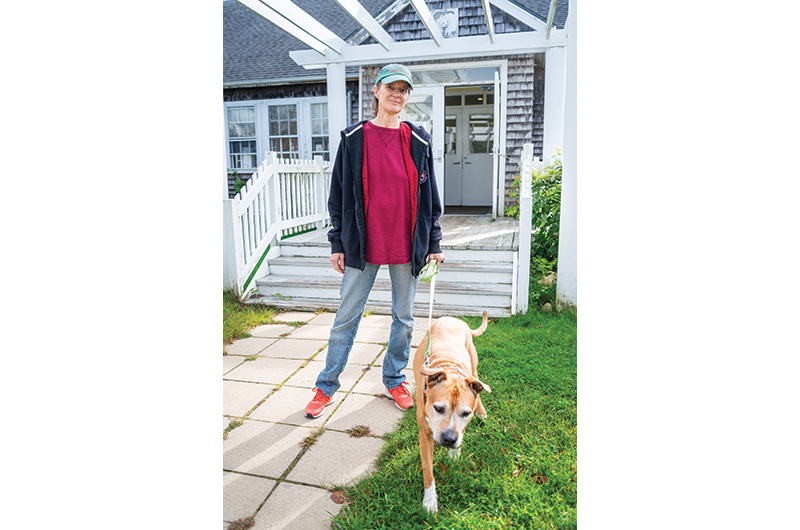Marina Lent, who as Chilmark’s health agent led the extensive Covid contact tracing effort on the Vineyard during the height of the pandemic, holds her head in both hands, disconsolate, when asked about Covid’s toll in the United States, past, present, and future. While many officials say one million Americans died during the worst of the pandemic, she considers it a significant undercount. While I know of only one Vineyarder who died from Covid, she puts the real number at “more like a dozen.”
Now Aquinnah’s health agent, she reminds me that Covid continues to be a major cause of death, multiple times that of the flu. Many people have a dangerously unrealistic attitude about the virus’s continuing threat, she says. She is particularly concerned about the enduring long-term effects of Covid for some patients, noting cardiac damage and increased rates of diabetes, including in young, previously healthy people. “Millions around the world are suffering sometimes debilitating effects of Long Covid,” she says. “In this context, it seems reckless to give up the fight and accept ongoing, widespread transmission.”
Lent, sixty-four, walked a winding road to get to her current public health role. She studied ancient Greek, German literature, and philosophy in college, and international economics in graduate school. Her interest in social justice issues led her to organize anti-war demonstrations for the War Resisters League and to work for the West German Green Party and Greenpeace, the environmental organization. She then landed a dream job at the United Nations in New York.
But city living turned out not to be her dream. She moved to the Island, and enrolled in an emergency medical technician class that led her to work for all four Island ambulances from 1999 to 2008, and then the Chilmark Health Department until 2022. It was in her position as Chilmark’s health agent that she helped obtain a two-year, $300,000 Massachusetts Department of Public Health grant and played a lead role with the Island’s contact tracing initiative.
It was a challenge that played both to her temperament (“I was determined”) and her deep curiosity. She describes as eye-opening the interviews she conducted. A Covid-infected couple flew to the Vineyard from Manhattan on a private jet and easily isolated for two weeks in their Vineyard mansion – he upstairs, she downstairs. But six Brazilian men in one residence found it difficult to isolate. Lent asked: How were they going to make a living, how were they going to survive, if forced to isolate for two weeks?
To a lesser extent, contact tracing continues on the Island, even after the lifting of emergency protocols and mask mandates. But the primary challenge for local public health now, she says, is resisting the “panic/neglect” cycle that predictably leads to chaos and ineffective responses to pandemics. “Pandemics are a ‘when, not if’ event, and always have been,” she says. “But a number of factors, not least climate change bringing humans and animals increasingly into contact and conflict with one another, are making that ‘when’ closer than it used to be, while growing antimicrobial resistance is capable of bringing diseases both old and new to levels of damage not seen for a century.”
She pauses, then adds, “We are in for a bumpy ride in coming decades.”
In her spare time, Lent continues to research questions raised by her work: How many Islanders are infected at any given time, and with what Covid variants? Of those who die, how many were vaccinated? What is the cumulative damage to the community from Covid? How does Covid compare to past and present infectious diseases, such as West Nile virus, measles, polio, Lyme, or HIV/AIDS, to name a few.
While she calls the speedy production and administration of vaccines “a fabulous accomplishment,” she warns that current vaccines are no cure-all. “Our culture drives deeply toward a magic bullet,” she says. But existing vaccines don’t guarantee immunity. They are “a game changer in terms of harm reduction but not a game changer in terms of transmission,” she says.
“The trouble is people want a guarantee, and a guarantee is not what life offers.” She looks at my bearded face and my ears plugged with hearing aids and mentions the difficulty in ensuring my wearing a mask will prevent infection. “A mask is better than no mask, but it’s no magic bullet.” And, she says, I need to be realistic about the danger in driving my five grandchildren, though we’re all fully vaccinated: “The car is not necessarily designed for good ventilation.”
She fears people will be less protected tomorrow than they are today by current vaccines, given their waning immunity and willingness to mask, as well as the greater danger from future Covid variants. She hopes for a next-generation, efficacious vaccine with an increased breadth of variant coverage and duration of immunity. But meanwhile she worries about human nature: people’s “general wishful thinking – they don’t take the danger of the disease seriously. Covid will be a hazard forever.”





